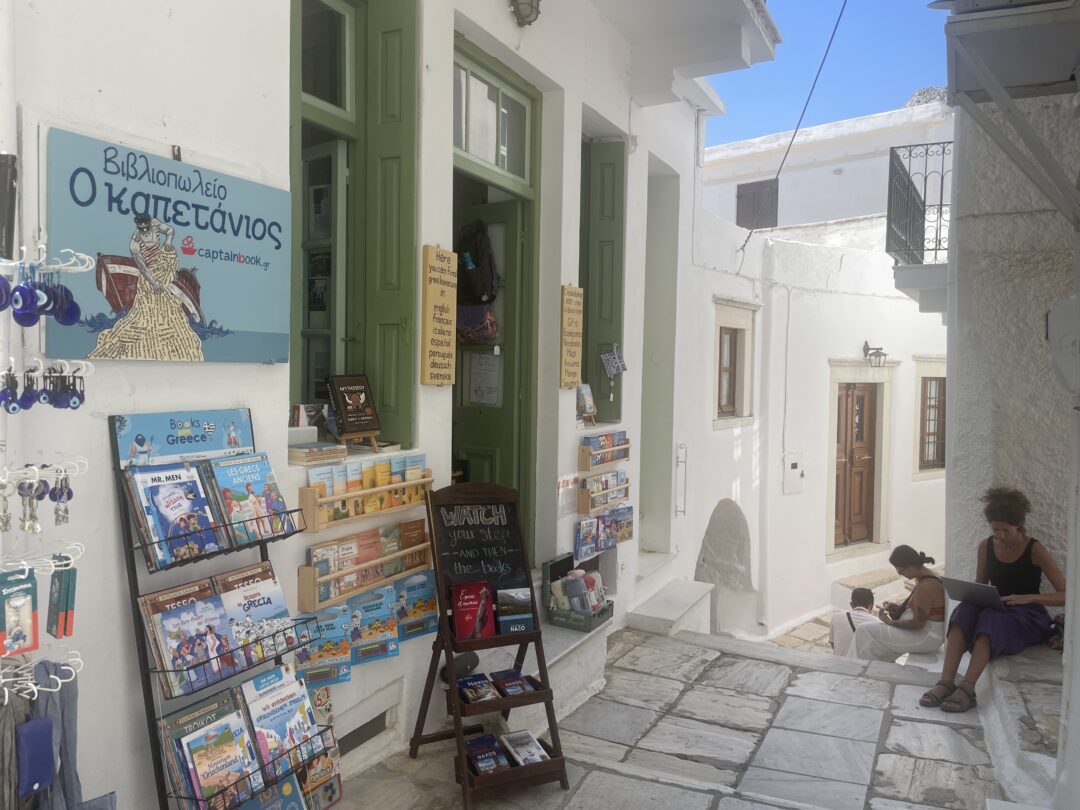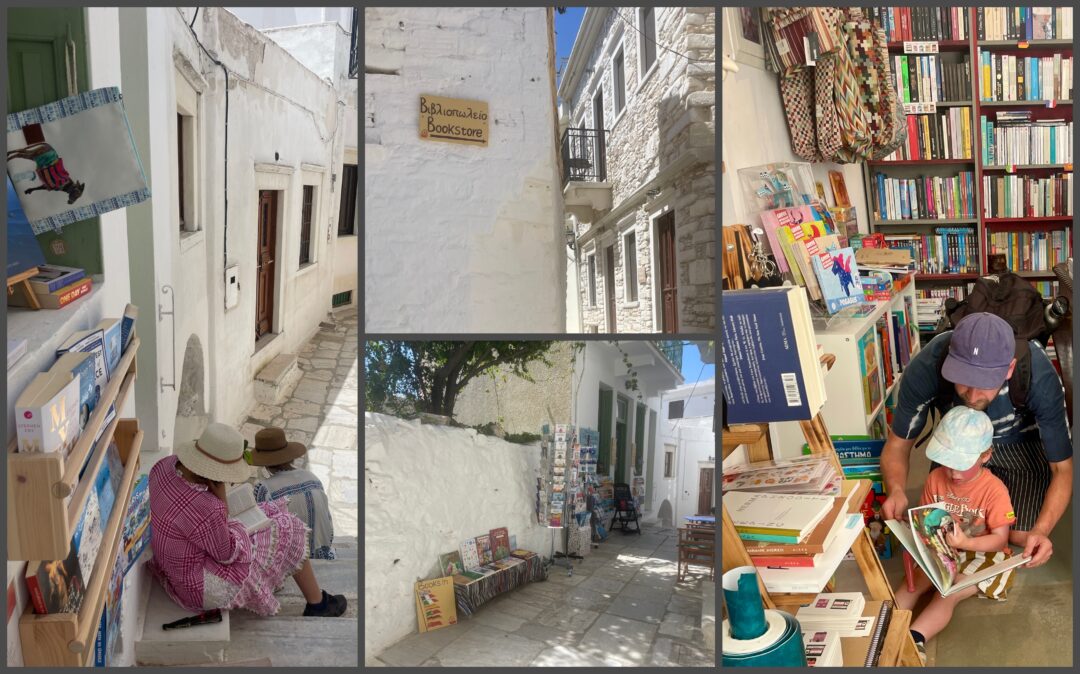Little bookstores constitute an integral part of our culture and our local communities. It’s the place where writers can connect with readers, where we discover new, unknown worlds, where children are captivated by the thrill of reading that can last a lifetime. They are the places that never stop inspiring us, uniting us and spreading the love for books. Their role proves crucial in case they are located in remote areas such as the Greek islands.

Reading Greece* presents ‘Kapetanios’ Bookstore, a little bookstore in Apeiranthos, Naxos, discussing the role of little bookstores and their influence on reading preferences, as well as the challenges they are faced with and the prospects ahead.
Kapetanios is a little bookstore in Apeiranthos, Naxos. What’s the story behind this venture of yours?
What drives us is our core belief that for every person out there -even for those who haven’t read a single page- there is a book out there that, once they find it, they will not be able to put it down. Kapetanios Bookstore set sail in June 2024. It took us 15 days from conception to implementation – should we apply for a Guinness world record? You can read our whole adventure here: https://www.captainbook.gr/post/To_Chroniko_Enos_(Astrapiaiou)_Kapetaniou
What kind of books can readers find in your bookstores?
On our shelves you will find Greek authors translated into English, French, Italian, German, Spanish etc. as well as foreign authors who write about Greece. There is also a collection of local authors, from Naxos and Apeiranthos, which we are constantly trying to enrich, and of course Greek and foreign literature, poetry and essays.
How important is the role of little bookstores? How do they influence reading preferences?
Βookstores, especially the little ones, are responsible for the books they have on their shelves. Particularly when a little bookstore is located in a remote area, readers will necessarily trust the bookseller’s recommendations. Recommending a book to someone is an art as much as a responsibility. I do a “mini-interview” before I recommend something. What are your interests, what’s the last book you read and if you liked it, who’s your favorite author, and other things that if you don’t lack time, it’s so much fun to talk about!
Which are the main challenges little bookstores face nowadays? How do you respond to these challenges? What about the prospects ahead?
The main challenge little bookstores face is simply to survive despite the fact that the state totally ignores us and does nothing to support us. When I announced to some non-Greek friends of mine that we are opening a bookstore in Apeiranthos, the first question everyone asked me was what subsidy we received from the state for this purpose. They took for granted that we received one and were stunned when I replied that there are no such things in Greece. This is one of the first things that need to change. Small bookshops in remote places are impossible to survive without some government support, especially if they are not located in tourist areas.
Another issue is the fixed book price law, a term unknown to readers; what’s shocking, however, is that even booksellers don’t know about it and is widely violated. For both small and large bookshops to survive in the book market, this law should be broadly upheld while its enforcement monitored by the relevant government bodies. Keeping a bookstore outside major cities is a quite difficult feat for booksellers. One solution would be to frequently host events like live readings and book presentations but again this cannot be done without some kind of subsidy or grant. No matter how willing we are – and we are indeed – it is impossible for a small bookshop to cover travel and accommodation costs for authors, translators, illustrators etc

Would you say that the recent socio-economic crisis and the pandemic that followed has broken the ties connecting part of the readers with the choices and orientation of traditional publishers, creating an aesthetic and intellectual space that may certainly grow?
A big part of readers no longer trust traditional publishers and thus new trends are created through the readers’ interaction on social networks. This has resulted, on the one hand, in the emergence of authors whose work wouldn’t be approved or deemed profitable by the traditional publishers, despite the fact that a significant number of readers engage with said author. On the other hand, however, we are witnessing a large increase in low quality publications since the sheer number of an author’s social media followers is the only thing that matters.
In the era of online communication, how have the social media influenced what people choose to read? How have reading preferences changed/evolved during the years?
Social media influence reading preferences, especially of young readers. TikTok and Instagram trends determine what GenZ chooses to read. So, there is a huge increase in books that are easy and quick to read and have more or less the same themes. For example, in the last few years there has been a massive surge in books that deal with gender and same-sex relationships on the one hand, and horror/mystery books for young people on the other. Another trend is adapting and reinterpreting myths and historical events of antiquity. Whether we have run out of stories or ancient Greek myths are so fashionable again, remains to be seen.
*Interview by Athina Rossoglou
TAGS: LITERATURE & BOOKS | READING GREECE













